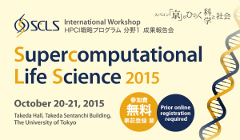
On October 20, an international workshop in Tokyo will feature presentations on the current state of the use of supercomputers in the area of life science. Topics will include molecular dynamics simulations, use of the GROMACS application, focusing on its use for antibody drug development, simulations of brain circuits, and biomedical big data analysis, focusing on the use of supercomputers for cancer research.
On the following day, there will be a public symposium, in Japanese, to present some of these topics to people with an interest in the latest research achievements and other activities in the life sciences using the K computer.
The symposium is being organized by the Strategic Programs for Innovative Research Field 1, “Supercomputational Life Science” (SCLS), a RIKEN-led program funded by MEXT which aims to expand the scope of computational life science toward medical care and drug discovery. Using the K computer—which is currently the fourth fastest supercomputer in the world—its members have integrated knowledge from dynamic multiscale life systems, consisting of the genome, molecules, cells, organs, and human body, to promote progress in understanding life systems.
Registration can be done on the symposium website.
